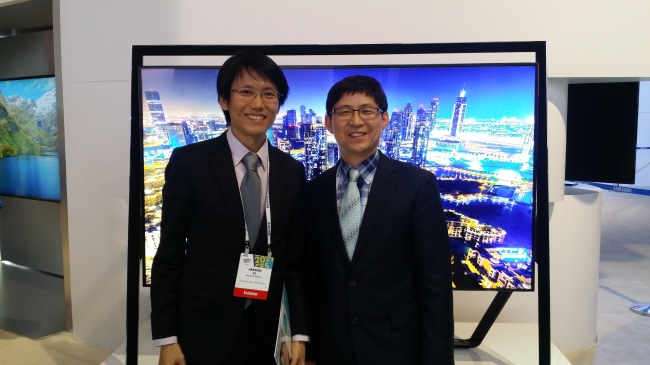
Camera module maker Haesung Optics, which supplies lens and camera modules to Samsung Electronics, will make inroads into the 3-D camera and retina recognition businesses in an effort to secure a new income source beyond its core smartphone parts.
“After having meetings with officials from global firms such as General Motors, General Electric and Nokia at the CES, it became clear which directions Haesung should take down the road,” Yi Jason, managing director of Haesung Optics, told The Korea Herald during the 2014 International CES last week.
“Utilizing 3-D camera systems and retina recognition solutions in smart cars and medical businesses will be our new growth engines for the firm along with the existing camera module business for smartphones, the current cash cow business for the firm,” Yi said.
Participating at the world’s largest consumer electronics show in Las Vegas last week, the Korean firm caught the eye of those global firms with its lens and camera modules for smartphones, and especially prototypes of retina recognition cameras and 3-D endoscopes.
The local mid-sized firm has earned most of its sales through supplying smartphone components including camera lenses and modules to Samsung, the world’s largest smartphone maker.
Yi said the company would make more efforts to secure other stable sources of profit by diversifying its business portfolio.
Around 80 percent or 100 billion won ($94 million) of its revenue last year came from sales of handset components.
He forecast this year’s sales would reach between 250 billion won and 300 billion won as the firm improves its production yield for mobile lenses and camera modules compared to last year, when it stood at around 30 percent.
“Last year’s production yield for camera modules was a bit lower than we expected as we only started mass-producing them a few years ago,” said Yi. “But things will be different this year.”
New businesses including 3-D optical technology, which can be used not only for endoscopes but also for action cameras and smart cars, would likely contribute to higher sales from this year, he noted.
The company will push itself further to differentiate itself by developing new technology for smart cars such as lane-keeping systems, 360-degree-view cameras and drowsiness detectors.
“The retina recognition technology, for example, can be used to enable drivers to control or activate functions of the car dashboard,” explained Yi, expressing a wish to collaborate with global car companies down the road.
By Kim Young-won (wone0102@heraldcorp.com)


![[Weekender] Geeks have never been so chic in Korea](http://res.heraldm.com/phpwas/restmb_idxmake.php?idx=644&simg=/content/image/2024/05/16/20240516050845_0.jpg&u=)
![[KH Explains] Why Korea's so tough on short selling](http://res.heraldm.com/phpwas/restmb_idxmake.php?idx=644&simg=/content/image/2024/05/19/20240519050115_0.jpg&u=20240520081646)
![[News Focus] Mystery deepens after hundreds of cat deaths in S. Korea](http://res.heraldm.com/phpwas/restmb_idxmake.php?idx=644&simg=/content/image/2024/05/17/20240517050800_0.jpg&u=)













